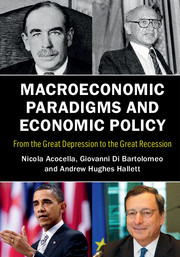Book contents
- Frontmatter
- Dedication
- Contents
- List of figures
- List of tables
- Preface
- Acknowledgments
- 1 Introduction
- Part I The emergence of alternative paradigms
- Part II Institutions and policies
- 7 Central banking
- 8 Fiscal regimes and fiscal policies
- 9 Further fiscal policy challenges
- 10 Conflicts and cooperation in the labor markets
- 11 Fixed exchange rates: the age of tempered liberalism
- 12 Free to float: the age of neoliberalism
- 13 A fragile European construction: the perils of incomplete coordination
- 14 Taking stock: the end of the ride or the beginning of a new one?
- Bibliography
- Index
14 - Taking stock: the end of the ride or the beginning of a new one?
from Part II - Institutions and policies
Published online by Cambridge University Press: 05 June 2016
- Frontmatter
- Dedication
- Contents
- List of figures
- List of tables
- Preface
- Acknowledgments
- 1 Introduction
- Part I The emergence of alternative paradigms
- Part II Institutions and policies
- 7 Central banking
- 8 Fiscal regimes and fiscal policies
- 9 Further fiscal policy challenges
- 10 Conflicts and cooperation in the labor markets
- 11 Fixed exchange rates: the age of tempered liberalism
- 12 Free to float: the age of neoliberalism
- 13 A fragile European construction: the perils of incomplete coordination
- 14 Taking stock: the end of the ride or the beginning of a new one?
- Bibliography
- Index
Summary
A century of theories and policies
Economic theory and economic policy are characterized by two factors: ideas and techniques. New ideas are not necessarily more powerful than older ones. By contrast, new techniques usually are. Our book has briefly followed the evolution of both over the past century.
An economic policy stance changes as a consequence of a mix of different factors such as changes in the economy and the emergence of new problems, changes in the political orientations of society, and the evolution of the foundations of economic theory. How these factors combine, possibly in very different ways over time, cannot be only the object of economic analysis. It also belongs to the realm of history.
In contrast to physical systems, economic systems evolve and change their rules. Different ideas can then be more appropriate under different circumstances. Economic policies implemented in each historical period respond to the specific needs or “emergencies” of that period but they draw inspiration from the stock of economic ideas and empirical observations that have accumulated over time.
Often, in the unexplored waters of economic changes, economic ideas, whether in policy or theory, suffer from inertia and lags in their implementation and development. This can lead to undesirable outcomes. In addition, economic policies reflect the sentiments, the preferences, and perhaps deeper goals, of society and its representatives, which are also mutable across time.
In a number of cases, which we have explored in this book, old ideas and policy suggestions come back and are revived and are then re-applied in modified forms. A review of the policies implemented in the last 70 years or so – and the theories that supported them – is therefore useful not so much as a historical reconstruction of their evolution but more as a way of assembling and understanding how the toolkit of an economist can be useful for current theoretical as well as applied analytic purposes.
The aim of the book has been to look at the evolution of macroeconomic policies and economic thought in the light of the development of the world economy. We proceeded, in each case, by connecting the development of economic needs and goals, policymakers’ choices, and economic ideas, stressing links and complementarities.
- Type
- Chapter
- Information
- Macroeconomic Paradigms and Economic PolicyFrom the Great Depression to the Great Recession, pp. 284 - 296Publisher: Cambridge University PressPrint publication year: 2016



